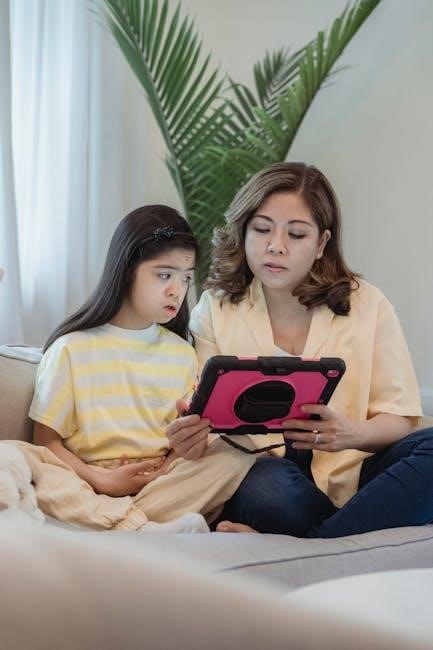Overview of Long-Term Care Functional Screen Instructions
The Long-Term Care Functional Screen Instructions (LTCFS) provide a structured framework for assessing functional abilities and care needs in long-term care settings, ensuring accurate eligibility determination and personalized care planning.

Functional assessments in long-term care are critical for evaluating an individual’s ability to perform daily tasks and activities. These assessments determine eligibility for care programs, such as Medicaid-funded services, and guide personalized care planning. They focus on physical, cognitive, and functional abilities, including mobility, self-care, and domestic life functioning. Accurate assessments ensure appropriate support services are provided, addressing the unique needs of each individual to enhance their quality of life and independence.
1.2 Purpose of the Long-Term Care Functional Screen (LTCFS)
The primary purpose of the LTCFS is to evaluate an individual’s functional abilities and determine eligibility for Medicaid-funded long-term care programs. It assesses physical and cognitive limitations, enabling care providers to develop tailored support services. The screen ensures that resources are allocated efficiently and that care plans address specific needs, promoting independence and improving quality of life for individuals requiring long-term care.

Components of the Long-Term Care Functional Screen
The LTCFS includes key domains like mobility, self-care, and cognitive function, along with standardized tools to assess physical and mental abilities, ensuring comprehensive evaluation.
2.1 Key Domains of Functional Assessment
The LTCFS evaluates essential domains such as mobility, self-care, and cognitive function to determine an individual’s ability to perform daily tasks. These domains assess physical capabilities, like walking or dressing, and mental capacities, such as decision-making. Additionally, domestic life functioning is considered to understand independence in household activities. By focusing on these areas, the screen provides a holistic view of an individual’s functional needs, guiding appropriate care planning and service eligibility.
2.2 Tools and Data Elements Used in the LTCFS
The LTCFS utilizes standardized tools and data elements to collect comprehensive information about an individual’s functional abilities; These include assessments of mobility, self-care, and domestic life functioning, as well as cognitive and physical health status. Standardized tools like Section GG are employed to ensure consistency and accuracy in evaluating daily living activities. This data helps determine eligibility for care programs and informs personalized service planning, ensuring effective care coordination and resource allocation.

Importance of Functional Assessments in Long-Term Care
Functional assessments are crucial for determining eligibility, enhancing care coordination, and ensuring personalized support, ultimately improving the quality of life for individuals in long-term care settings.
3.1 Determining Eligibility for Medicaid-Funded Programs
Functional assessments play a critical role in determining eligibility for Medicaid-funded long-term care programs; They evaluate an individual’s physical and mental abilities to perform daily tasks, ensuring accurate eligibility decisions. Tools like the Wisconsin Adult LTCFS assess functional limitations, helping to identify those who require support. This process ensures resources are allocated to those with the greatest needs, promoting equitable access to essential care services while maintaining program integrity and efficiency.
3.2 Enhancing Care Coordination and Service Planning
Functional assessments are instrumental in enhancing care coordination by identifying specific needs and preferences of individuals. This data enables tailored service plans that address physical, mental, and social requirements. By documenting functional abilities, healthcare providers can communicate effectively, ensuring seamless transitions between care settings. This collaborative approach optimizes resource allocation, improves patient outcomes, and aligns services with individual goals, fostering a more person-centered and efficient care delivery system.
Conducting the Long-Term Care Functional Screen
The LTCFS involves a standardized process to assess functional abilities, using validated tools to ensure accuracy and objectivity. Proper documentation and adherence to guidelines are essential.
4.1 Preparation and Documentation Requirements
Conducting the LTCFS requires thorough preparation, including reviewing the individual’s medical history and ensuring all necessary tools and forms are available. Accurate documentation of functional abilities, cognitive status, and care needs is essential. This includes completing assessment forms, noting observations, and ensuring informed consent. Documentation must be clear, concise, and maintained securely to ensure confidentiality and compliance with regulations. Proper preparation and documentation are critical for accurate and reliable screening results, facilitating effective care planning and eligibility determination.
4.2 Step-by-Step Screening Process
The LTCFS begins with initiating the screening process, ensuring the individual and caregivers are informed and consent. Next, gather relevant medical and functional history. Use standardized tools to assess physical, cognitive, and functional abilities. Document observations and responses accurately. Score each domain based on predefined criteria. Review and interpret results to determine care needs. Ensure all findings are recorded and shared with the care team for planning. This structured approach ensures consistency and accuracy in the screening process.
Interpreting and Applying Screen Results
Interpreting LTCFS results involves scoring functional abilities, categorizing needs, and linking outcomes to personalized care plans, ensuring tailored support and effective service planning.
5.1 Scoring and Categorizing Functional Ability
The LTCFS results are scored based on an individual’s ability to perform daily tasks, with categories ranging from independence to full dependency. Standardized tools, such as the Resident Assessment Instrument (RAI) and Section GG, guide the scoring process. Scores are categorized into levels of functional ability, helping providers understand care needs and develop targeted interventions. This system ensures consistency and accuracy in assessing physical and cognitive capabilities, aligning with Medicaid eligibility criteria.
5.2 Linking Assessment Outcomes to Care Plans
Assessment outcomes from the LTCFS are directly linked to care plans, ensuring personalized support based on identified needs. Functional ability scores guide the development of tailored interventions, addressing specific deficits in areas like mobility or self-care. This systematic approach ensures that care plans are aligned with individual requirements, fostering improved health outcomes and quality of life. Healthcare providers use these insights to coordinate services effectively, optimizing resource allocation and ensuring continuity of care.
Role of Functional Screens in Care Planning
Functional screens play a crucial role in care planning by identifying individual needs and tailoring support services, ensuring personalized and effective care delivery.
6.1 tailoring Support Services to Individual Needs
6.1 Tailoring Support Services to Individual Needs
Functional screens enable personalized care by assessing physical, cognitive, and emotional needs. This ensures support services are customized to address specific challenges, such as mobility issues or dementia care. By identifying individual requirements, care plans can prioritize interventions, fostering independence and quality of life. Tools like Section GG help score functional abilities, guiding targeted assistance and resource allocation. This tailored approach ensures efficient and effective support, meeting unique client needs comprehensively.
6.2 Monitoring Progress and Reassessments
Regular monitoring ensures care plans stay aligned with evolving needs. Reassessments occur annually or when significant changes in health or function are noted. Tools like Section GG and the Resident Assessment Instrument (RAI) track progress, identifying improvements or declines. This ongoing process allows for timely adjustments, ensuring services remain relevant and effective. Continuous evaluation supports better health outcomes and maintains the quality of long-term care provided.

Challenges and Considerations in Functional Screening
Functional screening faces challenges like cognitive and physical limitations, ensuring accurate and objective assessments while addressing diverse patient needs and maintaining reliable data for care planning decisions.
7.1 Addressing Cognitive and Physical Limitations
Cognitive and physical limitations pose significant challenges in functional screening, requiring tailored approaches to ensure accurate assessments. For individuals with cognitive impairments, tools must accommodate communication decline and memory issues. Physical limitations, such as mobility challenges, demand adjustments in evaluation methods. Assessors must use validated tools and techniques to account for these factors, ensuring reliable data collection while respecting the individual’s capabilities and needs. This ensures equitable and person-centered care planning.
7.2 Ensuring Accuracy and Objectivity in Assessments
Ensuring accuracy and objectivity in functional assessments is critical for reliable results. Standardized tools and protocols minimize bias, while thorough training of assessors promotes consistency. Regular audits and feedback mechanisms help maintain quality. Clear documentation and interdisciplinary collaboration further enhance reliability. Objective scoring systems reduce subjectivity, ensuring equitable care planning and resource allocation based on true needs. These measures are essential for fair and effective long-term care functional screening processes.

Future Directions in Long-Term Care Functional Assessments
Future directions focus on integrating advanced technologies to enhance efficiency and accuracy in functional assessments, while fostering stronger interdisciplinary collaboration for comprehensive care planning and improved outcomes.
8.1 Integration of Technology for Improved Efficiency
The integration of technology, such as digital assessment tools and AI-driven platforms, aims to streamline functional assessments, reduce administrative burdens, and enhance data accuracy. Real-time monitoring and automated scoring systems can improve the efficiency of care planning and eligibility determinations. Additionally, technology facilitates better data sharing among healthcare providers, enabling more coordinated and personalized care for long-term care recipients. These innovations are expected to modernize the assessment process significantly.
8.2 Enhancing Interdisciplinary Collaboration
Enhancing interdisciplinary collaboration is crucial for effective long-term care functional assessments. Standardized tools and shared documentation ensure consistency across providers. Regular team training and open communication platforms foster a cohesive approach. This collaboration leads to comprehensive care plans, improving patient outcomes and reducing gaps in service delivery. It also promotes accurate eligibility determinations and personalized support, benefiting both providers and recipients.
